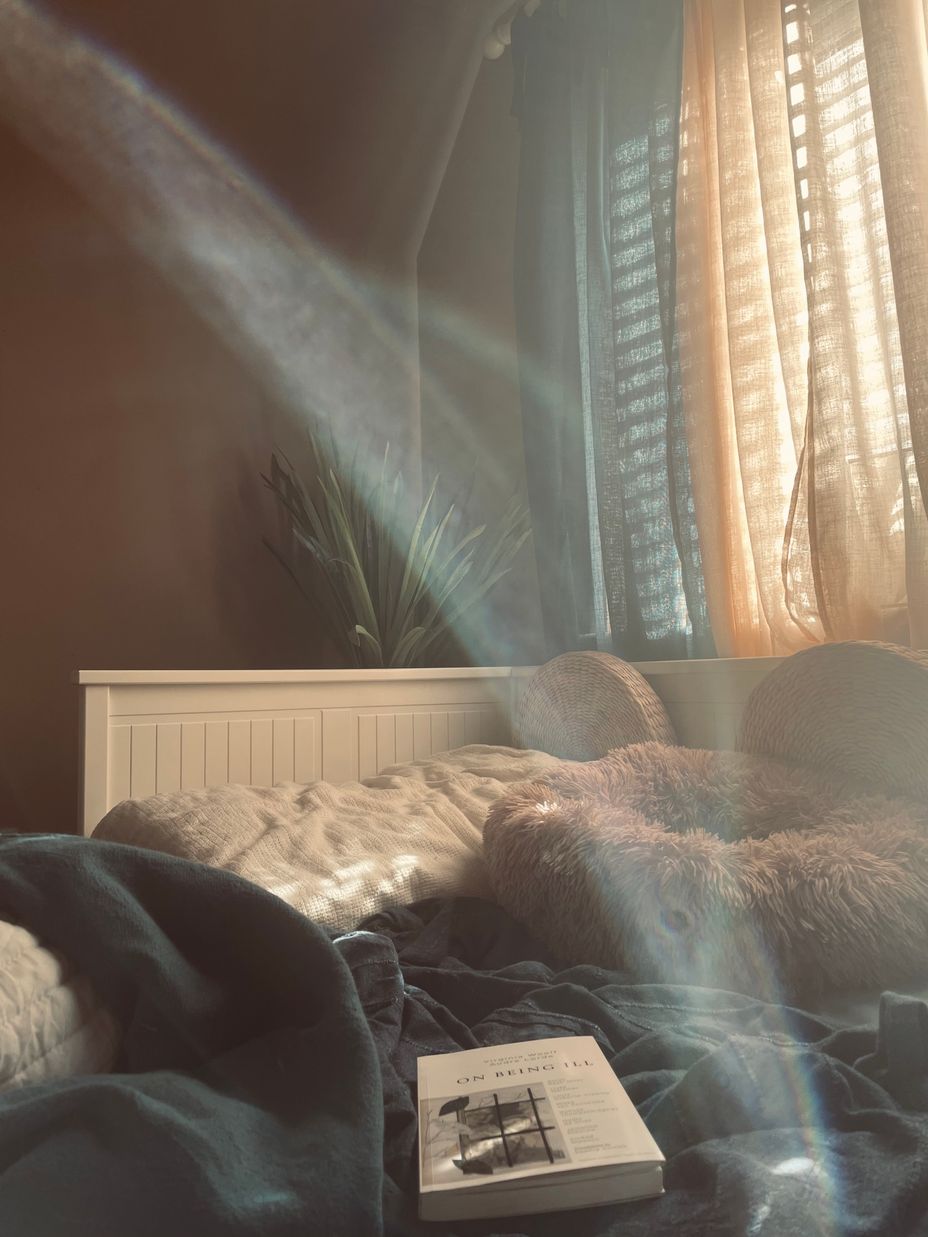On Being Ill
My first post comes to you from across my rumbled bed linen after I laid down my current read to capture a moment of fractured light that appeared above my resting space, slash cell. There is, an ugly joy or ‘jolie laide’ to borrow from the French idiom, in finding a body of work that so accurately describes what it is to be chronically ill. And better yet, the ability to dip in and out randomly is a gift to the energy impaired, as opposed to the commitment that a novel inevitably demands.
If you haven’t yet read Virginia Woolf’s seminal essay ‘On Being Ill’ I highly recommend this collection of essays that includes Audre Lorde’s ‘Introduction From The Cancer Journals’, contributions from poet laureate Lieke Marsman, and artist and filmmaker Jameisha Prescod, to name but a few.
To know anything about Virginia’s struggles with her health and mental health; is to know that anything she may write about Being Ill, is to anticipate that Virginia is unafraid to explore all four temperaments of personality. Each drop of ink with which she sanguinely scribes, drips with a choleric disenchantment that illness has been cast aside in literature in favour of supposed greater topics like love. Yet with phlegmatic authority and beautifully florid prose, she argues the case that many of us will inevitably in some form or other, spend a great deal of our lives acquainted with illness, and it’s altering effect on the human experience.
Virginia then offers a melancholic answer to the question of why there are no great volumes dedicated to the state of being sick: that illness is something uniquely individual, so few writers attempt to dedicate entire novels to try describe it’s profound meaning. For Illness is that unrelenting villain whose pathos is best summarised by Virginia’s singular, and all encompassing, line “the world has changed its shape”.
Dutch poet laureate Lieke Marsman says of her battle with cancer, “I need the illusion that I can influence my illness and recovery process, and so I tell myself that this is a fight. Is this unfair to those who did not survive the battle with cancer? No. What is unfair for those who died of cancer is the fact that there are others who have never been sick and yet feel they have the right to tell cancer patients how to talk about their own illness.” Quite.
Not content in her victory, Lieke then sets the battleground ablaze with a phrase that confirms in one line, why the pen is mightier than any sword, and why we, the chronically ill, are indeed The Mighty. “The hardest fighting happens in the wars where there are no winners.”
Jameisha Prescod has me at the title of her essay dedicated to her battle to get her lupus diagnosed “Believing Your Pain As Radical Self-Care.” It is a notion so obvious once stated. Believing in ourselves, our bodies, our aches, our pains, and our disabilities, IS a radical act of self-care. Jameisha writes of her diagnosis journey in a way that perfectly summarises and mirrors that of all who suffer from some form of chronic illness, that does not fit into a neat little check box on a standard diagnostic form.
“My eventual diagnosis was anything but collaborative. There’s a reason why it feels like you’re sitting in the head-master’s office when you’re waiting for your appointment. You desperately try to remember all of your symptoms and the dates on which they appeared. You attempt to speak clearly and quickly before your five minutes are up. You try your best to communicate well, but not too well in fear that you will look too healthy, but you also want to be honest so that they don’t accuse you of malingering. You try to be the perfect student or patient—or both. But it doesn’t matter. If you’re unlucky enough to have a doctor who is unaware of how bizarre and confusing the human body and, by extension, chronic illnesses can be, then you simply won’t be believed.”
On Being Ill
Hetmoet Publishers
#virginiawoolf #onbeingill #ChronicIllness #ChronicDepression #Cancer #ChronicPain #Lupus #thisismetrying #thisisustrying #bedbound

